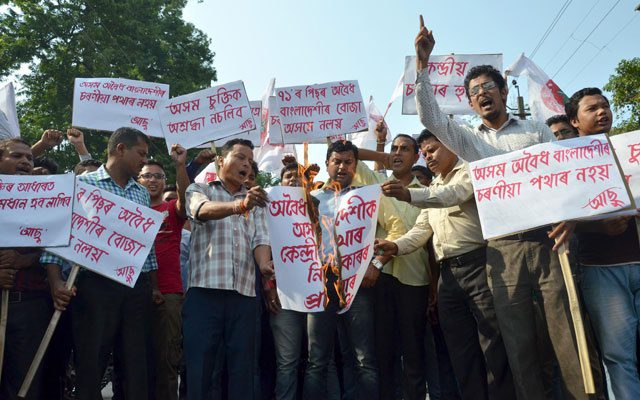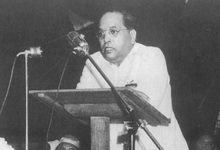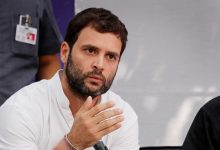As Trinamool Congress Rajya Sabha and lawyer Sukhendu Roy points out, only a few weeks ago Hajela told newspersons that there was no possibility that large numbers of people would remain unlisted out of the total state population of 3.29 crore. The first draft list had not included names of 1.3 crore people. But in the second and final list (released on July 30), NRC authorities were concerned with around 2,50,000 or so apparently ‘doubtful’ cases. A report, for Different Truths.
There are strong reasons to conclude that overzealousness of some Assam state officials in dismissing claims of Indian citizenship might have resulted in rendering over 40 lakh people suddenly stateless. Mainly Bengali Hindus and Muslim residents, these people did not find their names in the upgraded National Register of Citizens (NRC) released on July 30.
A general fear expressed by minority political organisations and social groups in Assam that even long-time residents would not be listed has been brutally fulfilled. Official statements issued by Prateek Hajela, supervisor of the NRC upgrading exercise in Assam and others, only added to the general confusion.
As Trinamool Congress (TMC) Rajya Sabha and lawyer Sukhendu Roy points out, only a few weeks ago Hajela told newspersons that there was no possibility that large numbers of people would remain unlisted out of the total state population of 3.29 crore. The first draft list had not included names of 1.3 crore people. But in the second and final list (released on July 30), NRC authorities were concerned with around 2,50,000 or so apparently ‘doubtful’ cases, he had said.
Roy’s pointed question in the Rajya Sabha: “By what magic the earlier figure of around 2 to 3 lakhs of people has increased within weeks to over four million? I challenge anyone in the House to show me another instance in the world where 40 lakh people had been made stateless at a stroke, as has happened in Assam,” remained unanswered.
But in all fairness, this was a query that should be addressed not to the Chairman of the Rajya Sabha or the Union Home Minister, but to officers like Hajela and his boss Sailesh. They certainly owe the country a thorough, convincing explanation for their sensational findings. Both addressed their long-awaited press meet on July 30 with a self-satisfied – even smug – air of having completed a difficult job, taking largely laudatory questions from local scribes.
No wonder major parties like INC, SP, BSP, AAP, and TDP supported Roy’s contention in the Rajya Sabha. Even BJP president Amit Shah’s vigorous defence of the preparation of a new NRC did not help matters. Isolated, BJP leaders could only say that their party was not involved, all NRC-related activities were being carried out on orders from the Supreme Court. The intention was to trace illegal immigrants from Bangladesh, who had entered into Assam after March 24, 1971, taken as a cut-off point on the citizenship issue.
Still, most BJP leaders including Home Minister Rajnath Singh, sensing the political mood and national impact of developments in Assam, repeatedly clarified that even the July 30 list was a ‘draft, not final’ – a sure indication of a tactical retreat. In Assam too, while chief minister Sarbananda Sonowal and others talked of ‘going forward’ on the NRC work, they emphasised that none would be victimised and there would be fresh opportunities for appeal and fresh applications.
Here arise fresh concerns: would the NRC-related work carry on forever, or until the 2019 Lok Sabha polls? And what of suddenly stateless people, whose number has inexplicably catapulted from ‘a couple of lakhs’ to the multi-million level? Past experience of spotting ‘lakhs of illegal aliens in Assam ‘as evident from work done by official authorities during the tenure of the IMDT Act or using the Foreigners Act, suggests that the smaller number of immigrants indicated earlier might be nearer the truth.
Again, whether millions or lakhs or thousands, where would the unlisted people of Assam go? Bangladesh is less than ecstatic about accepting large numbers of people simply because Assam authorities would want to get rid of them. Initially, Mamata Banerjee had sounded more positive, but her party would be devastated by the political backlash and the resultant economic burden – already Bengal is the second most densely populated state in India!
However, the Supreme Court applied a brake on the ‘going forward’ brigade. It informed the NRC authorities that its work must be ‘fair’. Further, it asked them to spell out the modalities they had followed in their work within a specified time. Most importantly, the Court said that in case there were mistakes they would be suitably rectified. Meantime, there must be no official action against anyone or any harassment. No talk of mass arrests, herding of people in detention camps or taking away their voting rights.
For once, Mamata Banerjee clearly won the day. As with challenging most decisions taken by the BJP in the strongest possible manner, she certainly brought the opposition together on the question of opposing the NTC findings. Quite apart from taking on the BJP for its allegedly divisiveness and sectarian policies, she highlighted some very damaging and palpable evidence of the extremely sloppy work done by the NRC officials.
Leave aside poor barely literate Hindu/Muslim Bengali peasants from the interior, who have no defence in case the authorities reject their documents, why were descendants of late President of India Fakhruddin Ali Ahmed not listed as citizens of Assam? On what criteria did NRC authorities dutifully register secessionist ULFA leader Paresh Barua as a citizen, but not his relatives whose apparent crime is that they are not fugitives? On what grounds MP Badruddin Ajmal, former state minister Ardhendu Dey, and many other MPs and MLAs were initially not included in the first list? For poor documentation, their surnames, language or politics? Why in many cases old parents have been left out but not their sons and daughters, or vice versa? What is the extent of such howlers and how many have been punished for their wretched inefficiency that has caused so much public grief?
In case there are scores of such instances, concerned NRC officials should be the first to be punished for their errors, bias or partiality. The authorities, who are yet to issue an apology or minimum public explanation, should be made to pay and immediately compensate out of their own salaries the poor among the victims of their criminal negligence for the harassment, tension and expenses they have suffered.
The Supreme Court has acknowledged the need for corrections somewhat late. It should have ensured stricter monitoring of the NRC-related business in Assam from the beginning, saving the nation and common people from much avoidable misery.
Ashis Biswas
©IPA Service
Photo from the Internet





 By
By
 By
By
 By
By